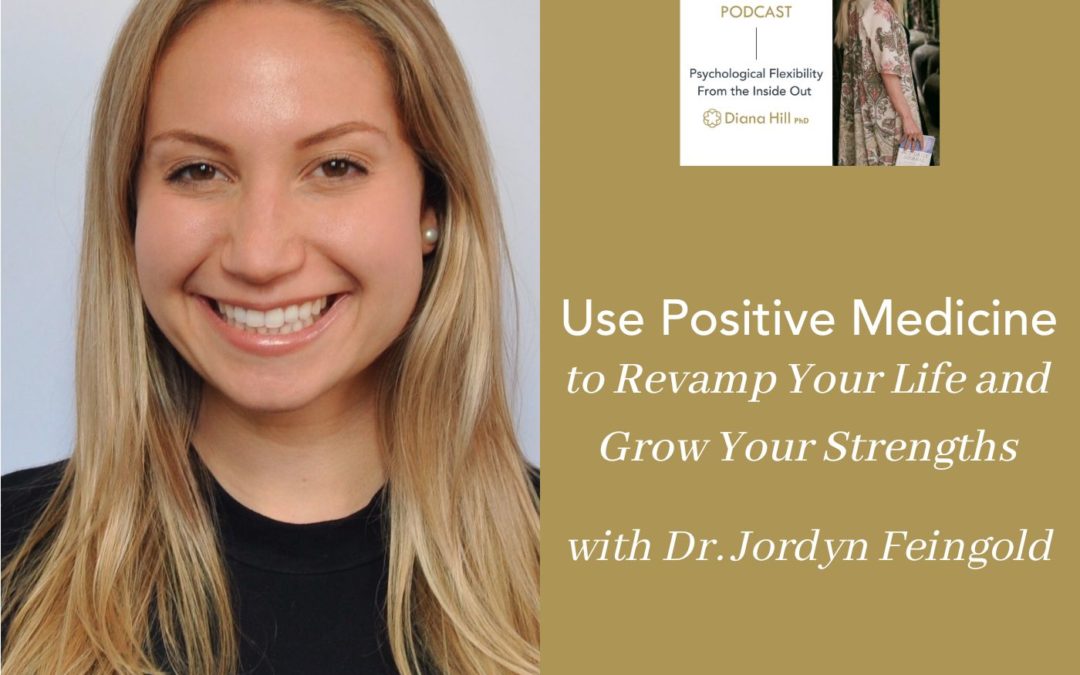Psychological well-being and physical health are not separate. Your relationships, values, and strengths can help you heal physically and grow emotionally. In this episode, Dr. Jordyn Feingold introduces the concept of Positive Medicine, which supports doctors in integrating positive psychology interventions into their medical practice. Her REVAMP model highlights relationships, engagement, vitality, achievement, meaning, and positive emotions as central to your physical and mental well-being. Dr. Diana Hill asks Dr. Feingold some BIG TALK questions and explores how she uses these principles in her stressful life. Listen to learn how to find your strengths, get motivated, and choose growth.
Listen and Learn:
- The importance of big talk vs. small talk in building connection
- Some big talk questions you can use to deepen your relationships
- Why the word self-esteem rubs Diana the wrong way
- The distinction between grandiose and vulnerable narcissism
- How imposter syndrome is linked to vulnerable narcissism
- What is healthy self-esteem
- What is positive medicine
- The REVAMP model developed by Dr. Feingold
- The gut-brain axis in unexplained GI problems
About Dr. Jordyn Feingold
Jordyn H. Feingold, MD, MAPP, MSCR is a resident physician in psychiatry at the Icahn School of Medicine at Mount Sinai in NYC, well-being researcher, and positive psychology practitioner. Her research and clinical interests involve the brain-gut axis, mind-body approaches to complex medical and psychiatric illness, protecting and promoting health care worker and patient well-being, and incorporating positive psychology approaches into health care delivery. She is co-author of Choose Growth: A Workbook for Transcending Trauma, Fear, and Self-Doubt, with Scott Barry Kaufman.
Related Resources
- Become a MORE Life in Process member to support the show. You’ll be designated as a “Founding Member” as we build a community to discuss ideas and our practice from the show. Founding Members receive exclusive bonus content from Diana.
- Find out what kind of Striver you are and get your free Skillful Striving Toolkit
- Want to learn more about ACT? Take Diana’s on-demand course Foundations of ACT
- Read Choose Growth by Scott Barry Kaufman and Jordyn Feingold
- Read Flourish by Martin Seligman
- A quick guide to Martin Seligman’s PERMA model
- Research study on big talk and interpersonal closeness
- Listen to Episode 16 with Dr. Ellen Vora: Get back into balance with holistic psychiatry
Diana’s Events
- There is still space for you at Diana’s Reset and Restore Retreat in Costa Rica in 2023!
- Meditate with Diana at Yoga Soup
- Sign up for Diana’s From Striving to Thriving Summit!
- See Diana at an upcoming event
Connect With Diana
Thank you for listening to Your Life in Process! Subscribe to the podcast for free on Apple Podcasts, Spotify, Google Podcasts. If you have any questions or feedback you can submit feedback for the show, email podcast at yourlifeinprocess dot com or leave Diana an audio message at (805) 457-2776. Follow Diana at YouTube, Instagram, LinkedIn, Facebook, and Diana’s website.
Thank you to the team Craig and Ashley Hiatt. Thank you to Benjamin Gould of Bell & Branch for your beautiful music.
Remember when you become psychologically flexible, you become free.


